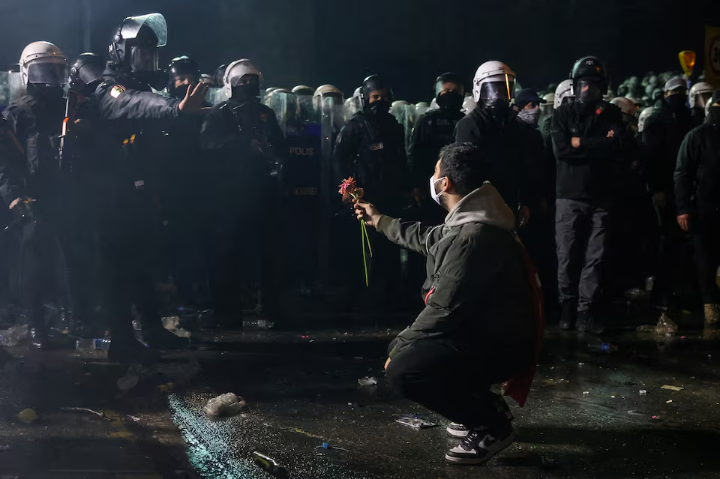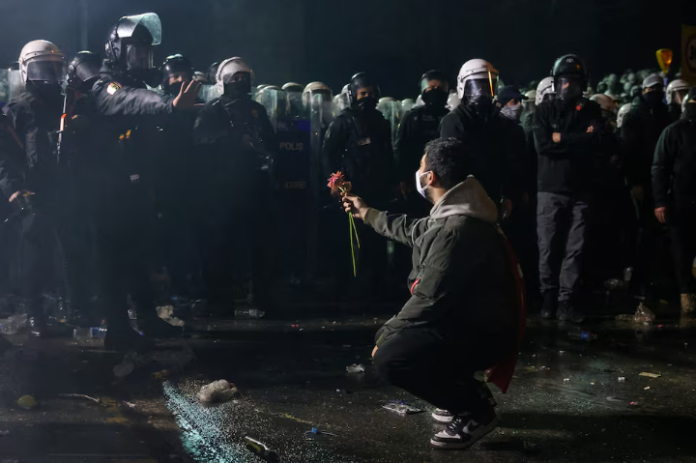Turkey is experiencing its largest wave of street protests in over a decade following the controversial arrest of Istanbul Mayor Ekrem Imamoglu. President Tayyip Erdogan has labeled the demonstrations a “movement of violence,” blaming the main opposition party, the Republican People’s Party (CHP), for the unrest.
The protests erupted last Wednesday when Imamoglu, a key political rival of Erdogan, was detained over corruption allegations—a charge he denies. On Sunday, a Turkish court ordered his imprisonment pending trial, sparking outrage among his supporters and escalating tensions across the country.
Erdogan Accuses Opposition of Provoking Unrest
Despite bans on public gatherings in multiple cities, thousands of people have continued protesting against what they claim is a politically motivated crackdown. CHP leader Ozgur Ozel has urged demonstrators to persist in their opposition, branding Imamoglu’s arrest as an attack on democracy.
Speaking after a cabinet meeting in Ankara, Erdogan accused the CHP of inciting violence and damaging public property. He held the party responsible for injuries sustained by 123 police officers during the protests, as well as damage to businesses.
“The opposition is accountable for the harm caused—both in parliament and in the judiciary,” Erdogan stated. Interior Minister Ali Yerlikaya reinforced this claim, alleging that some protesters were “terrorizing” the streets and threatening national security. Over 1,100 individuals have been detained so far.
Clashes and Crackdowns Continue Across Major Cities
In Istanbul, tensions reached a boiling point on Monday night when police used tear gas, water cannons, and rubber bullets to disperse demonstrators. In Ankara, protesters staged a sit-in, blocking key roads and demanding Imamoglu’s immediate release.
Ozel, addressing a massive crowd outside the Istanbul Municipality headquarters, called for a nationwide boycott of pro-Erdogan media and businesses. He also challenged the president to a televised debate, further intensifying the political battle.
Meanwhile, a CHP delegation met with Istanbul’s governor to discuss police brutality against peaceful demonstrators. Party officials claim that Sunday night’s clashes resulted in multiple hospitalizations due to excessive use of force by security forces.
International Reactions and Economic Fallout
The protests and Imamoglu’s arrest have drawn sharp criticism from human rights groups and European nations. Germany, a key player in Turkey’s EU membership talks, described the developments as a major setback for democracy. The EU-Turkey Joint Parliamentary Committee even postponed a scheduled meeting, citing the ongoing political crisis.

Economically, the turmoil has led to a sell-off in Turkish assets, causing the stock market to plummet by 16.6% last week—the worst decline since the 2008 financial crisis. The central bank has intervened to stabilize the Turkish lira, but analysts predict prolonged economic uncertainty.
Despite the economic fallout, Erdogan remains defiant, insisting that the opposition lacks the competence to govern. “These events prove the CHP cannot even manage local municipalities, let alone the country,” he said.
Is Turkey Heading Toward a Political Crisis?
As the protests continue, uncertainty looms over Turkey’s political future. Imamoglu’s supporters argue that his imprisonment is an attempt to eliminate Erdogan’s most formidable challenger. Some experts warn that this crisis could further weaken Turkey’s democratic institutions.
With nationwide demonstrations showing no signs of stopping, the coming weeks will be crucial in determining Turkey’s political trajectory. Will Erdogan tighten his grip on power, or will public pressure force a reconsideration of Imamoglu’s case?



